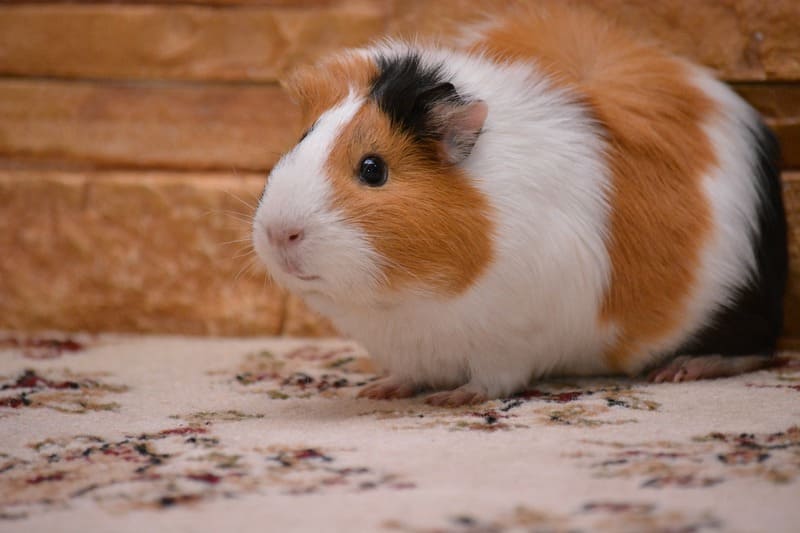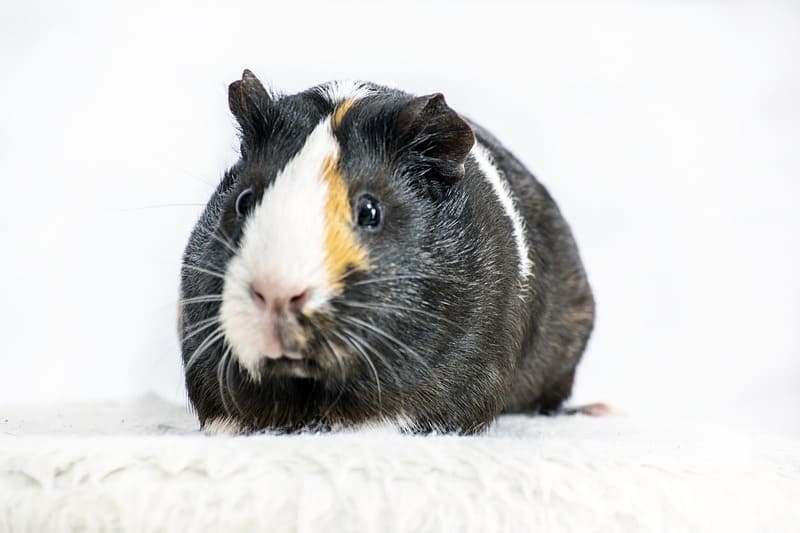Guinea pigs, also known as cavies, are charming and gentle small rodents that make delightful pets. Their playful antics and unique personalities endear them to pet owners around the world. However, like all animals, guinea pigs are susceptible to a range of health issues that can impact their well-being. In this comprehensive guide, we’ll explore the most common health issues that guinea pigs may face, including their causes, symptoms, prevention, and treatment.

1. Respiratory Infections
Causes: Respiratory infections in guinea pigs are often caused by bacteria, such as Bordetella bronchiseptica or Streptococcus pneumonia, but viruses can also be responsible. Poor ventilation, overcrowding, and stress can contribute to the development of respiratory infections.
Symptoms: Guinea pigs with respiratory infections may display signs such as sneezing, coughing, labored breathing, nasal discharge, and a reluctance to move. They may also lose their appetite and become lethargic.
Prevention: Providing a clean and well-ventilated living environment and avoiding overcrowding can help prevent respiratory infections. Reducing stress and avoiding exposure to sick animals is also crucial.
Treatment: Guinea pigs with respiratory infections should be seen by a veterinarian. Treatment may include antibiotics, supportive care, and adjustments to their living conditions.
2. Gastrointestinal Problems
Causes: Gastrointestinal issues, such as diarrhea, constipation, and bloat, can be caused by dietary imbalances, consumption of contaminated food or water, or changes in diet. Stress and dehydration can also contribute to these problems.
Symptoms: Signs of gastrointestinal problems in guinea pigs include changes in appetite, weight loss, diarrhea, constipation, abdominal pain, and a hunched posture.
Prevention: Feeding a well-balanced diet, providing fresh hay, and ensuring access to clean water can help prevent many gastrointestinal issues. Avoid sudden dietary changes and provide a stable, low-stress environment.
Treatment: Veterinary care is essential for guinea pigs with gastrointestinal problems. Treatment may involve dietary adjustments, hydration, and medications.
3. Dental Issues
Causes: Guinea pigs have continuously growing teeth, and dental problems can arise if their teeth become overgrown or misaligned. This can occur due to genetics, a lack of appropriate chew toys, or dental trauma.
Symptoms: Signs of dental issues include drooling, difficulty eating, weight loss, and a reluctance to chew. Overgrown teeth may be visible, and some guinea pigs may paw at their mouths.
Prevention: Providing guinea pigs with appropriate chew toys, feeding a diet high in fiber, and regular dental check-ups by a veterinarian can help prevent dental issues.
Treatment: Treatment typically involves trimming or filing down overgrown teeth. Some cases may require ongoing dental care.
4. Parasitic Infections
Causes: Guinea pigs can suffer from external parasites like mites and lice, as well as internal parasites like worms. Parasitic infections can be contracted through contact with infected animals or contaminated environments.
Symptoms: Infected guinea pigs may scratch or bite their fur excessively, leading to hair loss and skin irritation. In the case of internal parasites, symptoms may include weight loss, diarrhea, and lethargy.
Prevention: Keeping the living area clean and practicing good hygiene can help prevent parasitic infections. Quarantining new guinea pigs and regular veterinary check-ups can also detect and treat parasites early.
Treatment: Veterinary treatment is essential for parasitic infections. Treatment typically involves antiparasitic medications.
5. Urinary Tract Infections (UTIs)
Causes: UTIs in guinea pigs are often the result of bacterial infections. Stress, poor diet, and unsanitary living conditions can contribute to the development of UTIs.
Symptoms: Guinea pigs with UTIs may display signs like frequent urination, straining to urinate, blood in the urine, or a hunched posture. They may also have a decrease in appetite and lethargy.
Prevention: Maintaining a clean living environment, reducing stress, and providing access to fresh water can help prevent UTIs.
Treatment: Veterinary treatment is necessary for guinea pigs with UTIs. Treatment may involve antibiotics and supportive care.
6. Heat Stroke
Causes: Guinea pigs are sensitive to high temperatures, and heat stroke can occur if they are exposed to excessively hot conditions without adequate ventilation or access to water.
Symptoms: Signs of heat stroke in guinea pigs include panting, lethargy, rapid breathing, drooling, and a reluctance to move.
Prevention: Ensure guinea pigs are kept in a cool, well-ventilated environment during hot weather. Provide shade, fresh water, and avoid direct exposure to sunlight.
Treatment: Immediate treatment is essential. Guinea pigs with heat stroke should be moved to a cooler place, provided with water, and, in severe cases, may need veterinary care.
7. Bladder Stones
Causes: Bladder stones in guinea pigs can develop due to dietary imbalances or urinary tract infections. These stones can cause pain and blockage of the urinary tract.
Symptoms: Signs of bladder stones include straining to urinate, blood in the urine, pain, and a hunched posture. Affected guinea pigs may also groom their genital area excessively.
Prevention: Providing a balanced diet and access to clean water is crucial for preventing bladder stones. Avoid excessive calcium intake, as it can contribute to stone formation.
Treatment: Veterinary treatment is essential for guinea pigs with bladder stones. Treatment may involve surgical removal of the stones.
8. Eye Problems
Causes: Eye problems in guinea pigs can be caused by injuries, infections, or foreign objects. Poor living conditions, like dirty bedding or inadequate ventilation, can also contribute to eye issues.
Symptoms: Signs of eye problems include eye discharge, squinting, tearing, cloudiness, or redness. Infected or injured eyes can lead to discomfort and a reluctance to open the affected eye.
Prevention: Maintaining a clean living environment and ensuring guinea pigs are housed with compatible cage mates can help prevent eye problems. Regular inspections of your guinea pig’s eyes can detect issues early.
Treatment: Treatment depends on the specific issue but may involve cleaning the eye, applying medications, or addressing underlying infections.
9. Skin Problems
Causes: Skin issues in guinea pigs can result from fungal or bacterial infections, mites, lice, or poor grooming. Stress or changes in living conditions can also lead to skin problems.
Symptoms: Signs of skin issues include hair loss, red or irritated skin, scabs, or excessive scratching. Some guinea pigs may also develop lumps or abscesses.
Prevention: Providing a clean living environment and practicing good hygiene can help prevent skin problems. Regular grooming and inspections can also detect issues early.
Treatment: Treatment depends on the specific issue but may involve antifungal or antibacterial medications, grooming, or addressing underlying causes of stress.
10. Stress-Related Conditions
Causes: Guinea pigs are prone to stress-related health issues when exposed to stressful environments, sudden changes, or incompatible cage mates. Stress can weaken their immune system and lead to various health problems.
Symptoms: Signs of stress-related conditions may include a decrease in appetite, weight loss, a reluctance to move, overgrooming, and changes in behavior.
Prevention: Reducing stressors in the guinea pig’s environment, providing adequate hiding places, and monitoring their interactions with cage mates can help prevent stress-related conditions.
Treatment: Treatment may involve reducing stressors in the guinea pig’s life, addressing underlying issues, and providing supportive care.

What to Do If Your Guinea Pig Shows Signs of Illness
Guinea pigs are skilled at hiding signs of illness, making it even more critical for owners to be vigilant. If you notice any changes in your guinea pig’s behavior, appetite, or physical condition, it’s essential to take action promptly:
- Isolate the Affected Guinea Pig: If you suspect illness, it’s a good idea to isolate the affected guinea pig from their cage mates to prevent potential spread of infection and monitor their condition more closely.
- Consult a Veterinarian: Contact an experienced veterinarian who specializes in treating guinea pigs. A veterinarian will conduct a thorough examination, diagnose the issue, and provide treatment recommendations.
- Maintain a Supportive Environment: Ensure the guinea pig has a clean, comfortable, and stress-free environment. Provide fresh water and their usual diet, and keep them warm if necessary.
- Administer Medication as Prescribed: If your guinea pig is prescribed medication, follow the veterinarian’s instructions carefully. Always complete the full course of treatment, even if the guinea pig appears to be improving.
- Monitor Their Progress: Keep a close eye on your guinea pig’s progress and report any changes or concerns to the veterinarian. It’s important to communicate any improvements or worsening of symptoms.
- Practice Good Hygiene: Properly clean and disinfect the guinea pig’s living space to prevent the spread of disease.
Conclusion
Understanding and addressing common health issues in guinea pigs is crucial for their well-being. Regular veterinary check-ups, a clean living environment, a balanced diet, and attention to their behavior are key to maintaining the health and happiness of these small and beloved pets. Remember that guinea pigs are prey animals and may hide signs of illness, so being observant and proactive is essential for early detection and successful treatment of health problems. With proper care, guinea pigs can live long and fulfilling lives, providing their owners with joy and companionship for years to come.
